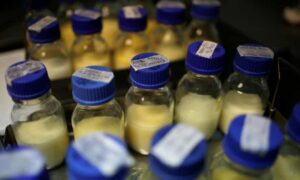
When he heard a hospital in Karachi was setting up a milk bank for babies, the news was a “huge relief” to Mohammad Munawwar.
With his wife very sick and their premature son Ayan in hospital, the 52-year-old father had had to collect milk five or six times a day from different female relatives who were breastfeeding their own babies.
His elation was short-lived; last month the bank closed before a single ounce could be deposited after complaints from Islamic clerics. Doctors who had been working on the bank for more than 12 months share Munawwar’s disappointment.
“We had been working on the bank [for] a year and had been in intense discussions with the religious clerics from Jamia Darul Uloom Karachi [for] the last eight months,” said Dr Jamal Raza, executive director of the Sindh Institute of Child Health and Neonatology (SICHN), which had established what should have been the first-ever milk bank in Pakistan, in collaboration with Unicef.
He said the scholars had raised several concerns, all of which were addressed, and after finally getting a nod from the seminary, the bank was inaugurated on 12 June.
But the seminary has now withdrawn its fatwa of assent, saying it had new advice that the hospital would find it not only “difficult but almost impossible to adhere to the strict conditions” set down by the institution’s clerics.
“The objective of the doctors who wanted to set up the human milk bank may be in good faith, but we concur with Jamia Darul Uloom Karachi, and do not think it needs to be encouraged,” said Hafiz Muhammad Tahir Mehmood Ashrafi, chair of the Pakistan Ulema Council, though he refused to elaborate.
